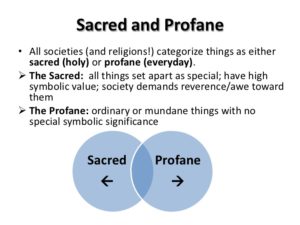NOTES ON SACRED AND PROFANE
“Sacred”, the meaning of this word in an abstract sense is the quality, of a particular thing, of holiness. In other words, if a thing is considered as it is sacred, it means it is holy. It is not an absolute word or in other words, holiness is the matter of belief, a material or thing which may be holy and scared for one society and community may not be considered as holy and sacred in other society. For instance take an example of cross, it is a holy symbol for Christians and not a holy symbol or sign for Hindus, the materials which are holy and sacred for Sikhs, for example Pagadi; it is a long cloth, wearied on head by Sikh and likewise there are many things which may not have value in one society but may possibly be considered as the most valued thing in other society.

Profane is the material, which also has values, same as scared materials, objects and holy scripts; but are negative in sense, i.e., in other words, they are unholy and impure, the word “profane” has its meaning in anonymity sense from the word sacred and pure. These are such object which is considered so much impure that, if come in contact then they are believed to contaminate them also.
These two words are on the based on the beliefs of people. One thing which is sacred in the view of an individual may be profane in the view of the other. The same thing may not even have any value, neither profane nor scared. The object may earn the value due to any reason, these reasons may include in them the orthodox values, illogical facts, astronomical factors etc.
The sacred and profane have same high emotional attitude towards them, it can be noticed or understood here that they both are not wholly or completely different or occupy different meaning in the literal sense. People considering a materialistic object as sacred works with an intention to keep separate: the things which are considered as sacred from the thing with profane values. This characteristic of isolation installs and fixes a unique feature to both the values, as two faces of the same coin.
A thing without value, with it, may get induced with the value of scarcity, i.e. pureness, and thus shall be gifted as the value of profanity. For example, The Ganga is a holy sacred river and thus the place from where it flows is also considered as sacred or holy, likewise, the area around the profane or unsuspicious graveyard is also considered and conferred with a value of profanity.
Sacred things, sometimes, begin to acquire their value with some specific rules. These rules are the rules which do not get accumulated suddenly and overnight and even if they get formed also, then to enforce in a society is not an easy task. Sacred things take time to collect auspicious value.
Practise Question and Answer
How Durkheim’s idea of Sacred and profane be used to understand contemporary society?
In ‘The Elementary Forms of Religious life,’ Durkheim argued that all societies divide the world into two categories: sacred and profane. Religion is based upon this division: it is a unified system of beliefs and practices related to sacred things – things set apart and forbidden.
Profane things are mundane. Anything that is not sacred is profane. Durkheim saw religion as the worship of society. Sacred rituals and forms of collective worship associated with them act to unify the group and promote social solidarity. It helps reinforce the collective conscience and order. In modern society, we see a ‘secular’ religion emerging. Watching sports is an example of some form of communal worship. The trophy or World Cup is seen as sacred.
Similarly, national pride and patriotism are sacred values. The unified grief of all Indians during terrorist attacks or natural disasters also reinforces the collective conscience. At the same time, the ‘sacred’ value of traditional religion is still powerful, as seen by the demand for online darshanam, Aastha TV, and live streaming on apps.
Thus, the sacred and profane can help understand the values upheld by any contemporary society and how they are reinforced.
We believe in sharing knowledge with everyone and making a positive change in society through our work and contributions. If you are interested in joining us, please check our ‘About’ page for more information
